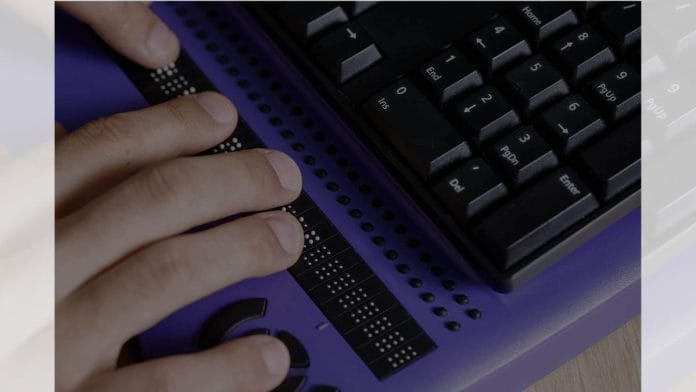New Delhi: In a landmark judgment addressing the Rights of Persons with Disabilities Act, 2016 (RPWD Act), the Delhi High Court Thursday ruled that the Airports Authority of India (AAI) cannot disqualify blind candidates for junior executive (JE) posts merely because a clinical medical assessment certifies they cannot perform work by “seeing”.
A bench of Justices C. Hari Shankar and Ajay Digpaul of the Delhi High Court quashed the cancellation of the candidature of three visually impaired petitioners. They had been rejected by taking into consideration the literal meaning of “seeing” as a functional requirement for posts officially identified as suitable for the blind.
The court underlined that the reassessment must aim “at ensuring that the petitioners are recruited, and not at excluding them”. It directed the AAI to conduct a non-medical reassessment of the three petitioners within two weeks.
The petitions were filed by Mudit Gupta, who applied for the post of junior executive (Law), Amit Kumar and Deepak Arora, who applied for junior executive posts in Common Cadre and Finance, respectively.
Although the AAI’s Advertisement in 2023 expressly identified these posts as suitable for persons with “Blindness (B) or Low Vision (LV) disabilities”, the petitioners’ candidatures were cancelled based on medical reports that certified they could not perform work by “seeing”.
The Delhi High Court rejected this reasoning outright, holding that the concept of “seeing” cannot be confined to ocular functionality alone. It must be interpreted in the context of cognitive ability, assistive technology, and reasonable accommodation.
“The power of cognition and understanding vests in the brain, not solely the eye, which acts only as a recorder and transmitter,” the bench observed. “If a blind candidate, with the aid of assistive devices, is able to perceive what is necessary to discharge the functions of the JE (Law) post, they must be regarded as possessing the functional attribute of sight.”
Also Read: How do you picture a blind person? The problem starts there
‘Suspicion-ridden model’
The court criticised AAI’s reliance on medical tests as the determinant of functional capability, terming it “unsustainable in law” and contrary to the inclusive intent of the RPWD Act.
“The fate of blind candidates, who are otherwise identified as suitable for the post of JE (Law), would become dependent on the doctor’s certification. If the doctor certifies that the blind candidate can see, he would be appointed; else, he would be rejected,” the judgment noted.
Drawing from the Supreme Court’s precedent in the case of Recruitment of Visually Impaired in Judicial Services vs The Registrar General, the High Court of Madhya Pradesh in 2024, the bench said the “suspicion-ridden, medical expertise-driven model” adopted by AAI violated the spirit of the law.
“The suitability, capacity, and capability of a person with disability, to function in a particular post, is not to be tested and measured by medical or clinical assessment,” the court said, emphasising that evaluation must be conducted only after providing reasonable accommodation and an enabling environment.
On their part, the petitioners argued that AAI’s exclusion of blind candidates contradicted the Department of Empowerment of Persons with Disabilities’ (DEPwD) notification dated 4 January 2021, which mandates that suitability be assessed “with appropriate software, aids and appliances support as per needs”.
The Delhi HC agreed, holding that the principle of reasonable accommodation lies at the heart of inclusive equality. “Prima facie, it appears that the functions to be performed by a Legal Assistant, or JE (Law), are not such as cannot be performed by a blind person, provided he is provided with the requisite aid and assistive devices,” the bench said.
It remarked that under AAI’s restrictive interpretation, even Senior Advocate S.K. Rungta, a leading figure in the disability rights movement who argued the case, would be deemed ineligible for such a post—an outcome that underscored the untenability of AAI’s stance.
The petitioners had also challenged Note 8 of the DEPwD notification, which allows employers to “examine suitability of the candidate in terms of functional requirements before appointment”. The Delhi High Court dismissed this challenge, upholding Note 8 as valid so long as it is applied in accordance with the statutory process under Section 33 of the RPWD Act, which mandates that governments reserve at least 3 percent of the total public sector vacancies for persons with specified disabilities.
In this case, the high court held that AAI’s implementation of Note 8 was “fundamentally flawed”, as it was used merely to justify a medical rejection rather than a functional assessment supported by accommodation.
Allowing the petitions in part, the high court issued the cancellation of the petitioners’ candidatures. It ordered that the functional suitability of the petitioners must be re-assessed within two weeks, through non-medical means and in accordance with principles of reasonable accommodation. The reassessment must focus “at ensuring that the petitioners are recruited, and not at excluding them”.
Lastly, petitioners found suitable must be offered appointments within four weeks, with continuity of service and all consequential benefits, though without back wages.
The judgment started with a quote from Jonathan Swift’s early 18th-century work, Polite Conversation in Three Dialogues: “There’s none so blind as they that won’t see.” The bench observed, “We, in this batch of cases, are faced with the question—can the blind see?”
(Edited by Viny Mishra)






